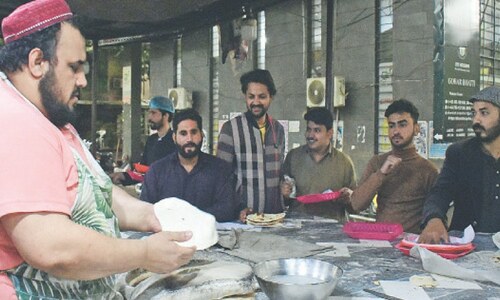
ISLAMABAD: An evening with a living legend of Pakistani performing arts and literary, Zia Mohyeddin, was held at the Pakistan National Council of the Arts (PNCA) on Saturday.
The event, titled Sham-i-Zauq Zia Mohyeddin Kay Saath, featured Mr Mohyeddin as he relived fond memories of pre-partition India and post-independence Pakistan’s golden era of literature and discussed the transformation of society and its decline by presenting selected works of literature and music.
The evening was organised by Islamabad-based NGO Rozan as a fundraiser.
Dressed in a light grey suit, Mr Mohyeddin walked on stage to a standing ovation. He recited selected pieces of literature, interspersed with sitar music by Rawalpindi musician Ustad Nafees Khan.
He began by reciting poetry and prose by Ghalib, including a letter he wrote to a friend narrating his indignation with the hypocrisy of society, economics and the social backwardness of Muslims, the crumbling feudal social structure, norms, political turmoil and tragedies of migration and the varieties, qualities and historical background of mangoes.
Then he changed the mood with a reading of a satirical masterpiece by the famous short story writer Krishan Chandra about his friend Dulat Ram in which he highlighted the issue of population growth.
Mr Mohyeddin began his professional career at Radio Pakistan after graduating from Government College Lahore in 1949. He moved to Radio Australia and then to the United Kingdom to study at the Royal Academy of Dramatic Art.
On his return, he ventured in producing, directing and acting in Urdu and English plays, but left after two years on a British Council fellowship to study directing. He performed in the play A Passage to India, as well as classic films such as Lawrence of Arabia and The Sailor from Gibraltar.
On Sunday he also recited N.M. Rashid’s Dream, a still-relevant depiction of the situation in India and Pakistan, the unfulfilled dreams millions of people had pinned on independence and the dreams sold to the underprivileged by political jugglers.
Then Mr Mohyeddin transitioned away from melancholy by reading a thumri – a form of Indian classical music –Lalit in Bhairo thaat accompanied by Ustad Nafees Khan.
He also read satirical writing by Pitras Bukhari, Mushtaq Yousufi, a parody by Ibn-i-Insha about Faiz, an excerpt from Intizar Hussain’s autobiography about the poet Mubarak Ahmed and his perspective on prominent women such as Kishwar Naheed, Benazir Bhutto, Sara Shugufta and Hema Malini.
He then recited Faiz’ Shaam, accompanied by singing and sitar by Ustad Nafees Khan.
At the end, Mr Mohyeddin read a satirical excerpt from his own autobiography about childhood memory that had the audience in stitches.
Earlier in the evening, actor, director and composer Arshad Mehmood gave a brief introductory speech during which he read an excerpt from Mushtaq Ahmed Yousufi’s Zar Gushat, a tribute to Mr Mohyeddin’s vast reading, his understanding of the selection and art of reading, and his captivating voice and narration of literary masterpieces.
Mr Mehmood is best known for composing music for Faiz’ ghazals and national songs, and has acted in popular television shows such as Aangan Terha, Dhoop Kinari, Ankahi and the hit comedy Fifty-Fifty. He also acted in the film Khamosh Pani in 2003.
Speaking at the start of the event, Rozan founding member and psychiatrist Dr Ambreen Ahmad said Rozan since its inception had worked on issues related to the sexual abuse of children and their emotional and mental wellbeing through counselling.
The organisation is currently undertaking four projects – Zeest, Rabta, Hamqadam and Aangan, for which Sunday’s fundraiser was held.
Dr Ahmad highlighted rising incidents of violence against children, saying one in six girls and one in 20 boys are sexually abused in Pakistan. She reaffirmed her organisation’s commitment to continue their efforts to eliminate this scourge from society.
Published in Dawn, August 13th, 2018















































Dear visitor, the comments section is undergoing an overhaul and will return soon.